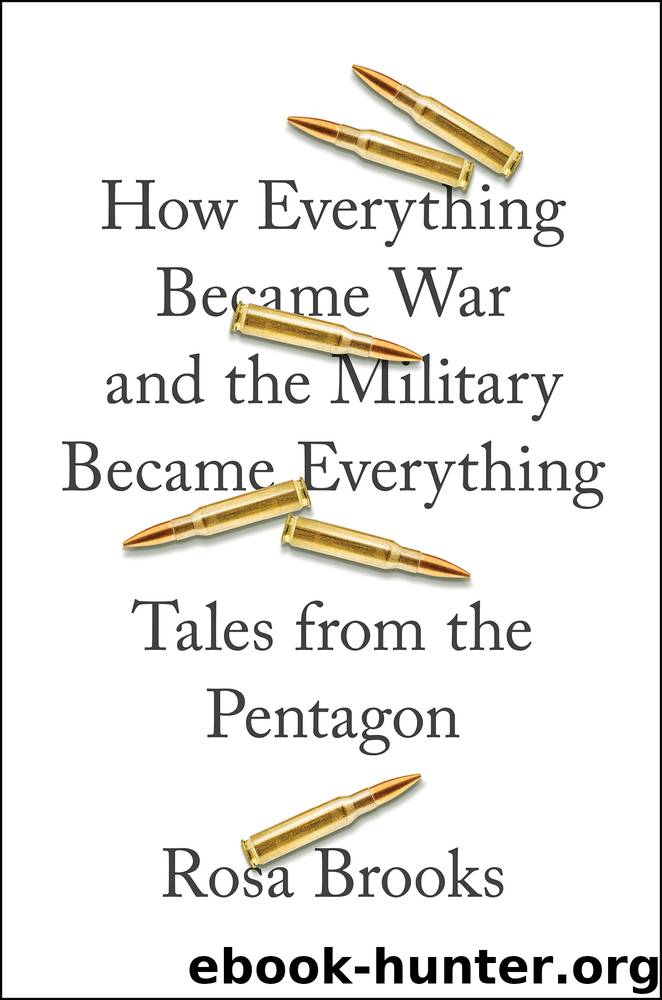How Everything Became War and the Military Became Everything by Rosa Brooks

Author:Rosa Brooks
Language: eng
Format: epub
Publisher: Simon & Schuster
Born in Blood
We can go further: maybe the apparent permanence and ubiquity of the nation-state is just a mirage. We take it for granted that states are (and ought to be, and must be) the building blocks of world order, viewed historically, the nation-state is a transient and contingent form of social organization.9 In fact, the history of the modern state is short—and not particularly happy. Since prehistory, groups of human beings have found a very wide range of ways to organize themselves into societies. The world has seen tribes, sects, feudal kingdoms, city-states, and religious empires, among other modes of social organization. The idea of the territorial nation-state as the locus of authority, within a system of formally equivalent similar states, is of quite recent vintage.
It was not until 1648, when the Peace of Westphalia ended the Thirty Years War, that the modern international system of sovereign states began to develop. Even after this symbolic starting point, it took centuries of conquest and many more wars before anything truly resembling today’s state system took shape.
In Europe, state consolidation was rarely peaceful: consider the three wars of the German unification, or the bloody excesses of the Italian unification. (It was the carnage of the Battle of Solferino that inspired Henry Dunant to form the International Committee of the Red Cross, and led indirectly to the emergence of the modern law of armed conflict.) Or think of France: during the “reign of terror” that followed the French Revolution, France’s revolutionary government publicly beheaded an estimated thirty to forty thousand people—all in the name of liberté, égalité, and fraternité. In the early 1790s, at least 150,000 other unfortunate French citoyens were shot, burned to death, hacked to pieces, or deliberately drowned in France’s Vendée region.10 “I crushed the children under the feet of the horses,” French general François Joseph Westermann is said to have written after one particularly brutal campaign. “I massacred the women who, at least for these, will not give birth to any more brigands. . . . I have exterminated all. The roads are sown with corpses.”11
National identity for the peoples of Europe didn’t come about naturally: it had to be created, in a process that only accelerated in the nineteenth century. Monuments were built and national anthems composed; regional dialects and various particularisms stamped out by central authorities, often ruthlessly.12 In the brutality of its state-building efforts, the so-called Islamic State is less historically atypical than we might prefer to imagine.13
One can see the ferocious militarism that has characterized Europe until the post–World War II period as a direct result of state expansion and nationalism—or, alternatively, in line with Charles Tilly’s argument, one can see state formation and nationalism as incidental by-products of militarism, as warlords required ever more elaborate infrastructural support to fund and sustain their armies.14 Either way, few scholars would dispute that the history of the state as the dominant form of social organization is a history dripping with blood.15
This has been as true in the rest of the world as in Europe.
Download
This site does not store any files on its server. We only index and link to content provided by other sites. Please contact the content providers to delete copyright contents if any and email us, we'll remove relevant links or contents immediately.
| Arms Control | Diplomacy |
| Security | Trades & Tariffs |
| Treaties | African |
| Asian | Australian & Oceanian |
| Canadian | Caribbean & Latin American |
| European | Middle Eastern |
| Russian & Former Soviet Union |
The Secret History by Donna Tartt(19034)
The Social Justice Warrior Handbook by Lisa De Pasquale(12183)
Thirteen Reasons Why by Jay Asher(8885)
This Is How You Lose Her by Junot Diaz(6873)
Weapons of Math Destruction by Cathy O'Neil(6261)
Zero to One by Peter Thiel(5782)
Beartown by Fredrik Backman(5734)
The Myth of the Strong Leader by Archie Brown(5495)
The Fire Next Time by James Baldwin(5426)
How Democracies Die by Steven Levitsky & Daniel Ziblatt(5211)
Promise Me, Dad by Joe Biden(5141)
Stone's Rules by Roger Stone(5080)
A Higher Loyalty: Truth, Lies, and Leadership by James Comey(4946)
100 Deadly Skills by Clint Emerson(4913)
Rise and Kill First by Ronen Bergman(4776)
Secrecy World by Jake Bernstein(4739)
The David Icke Guide to the Global Conspiracy (and how to end it) by David Icke(4697)
The Farm by Tom Rob Smith(4501)
The Doomsday Machine by Daniel Ellsberg(4482)
